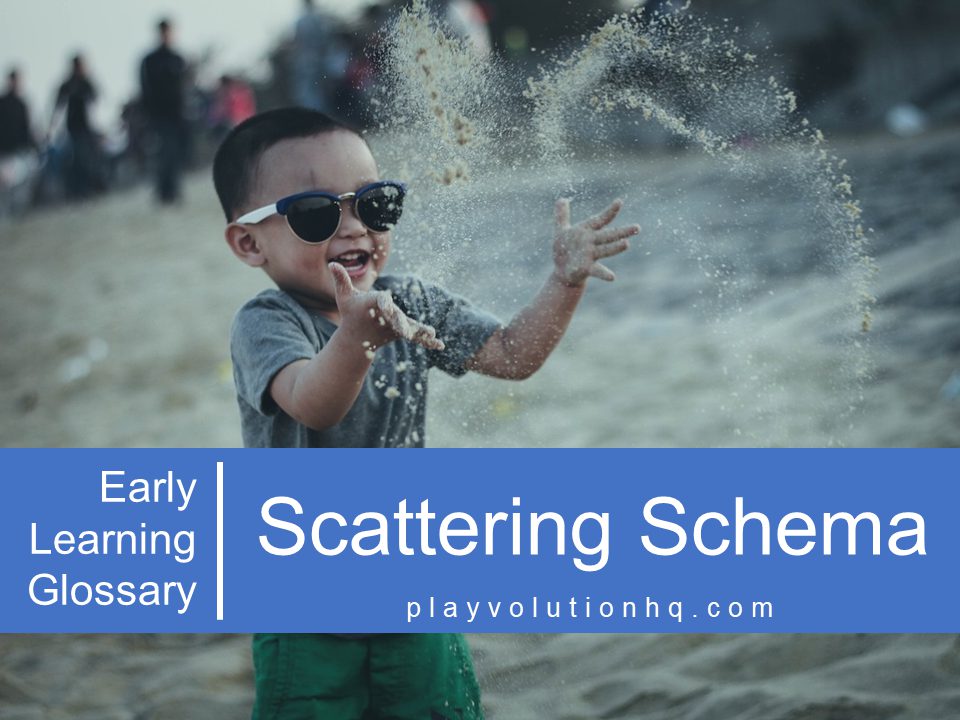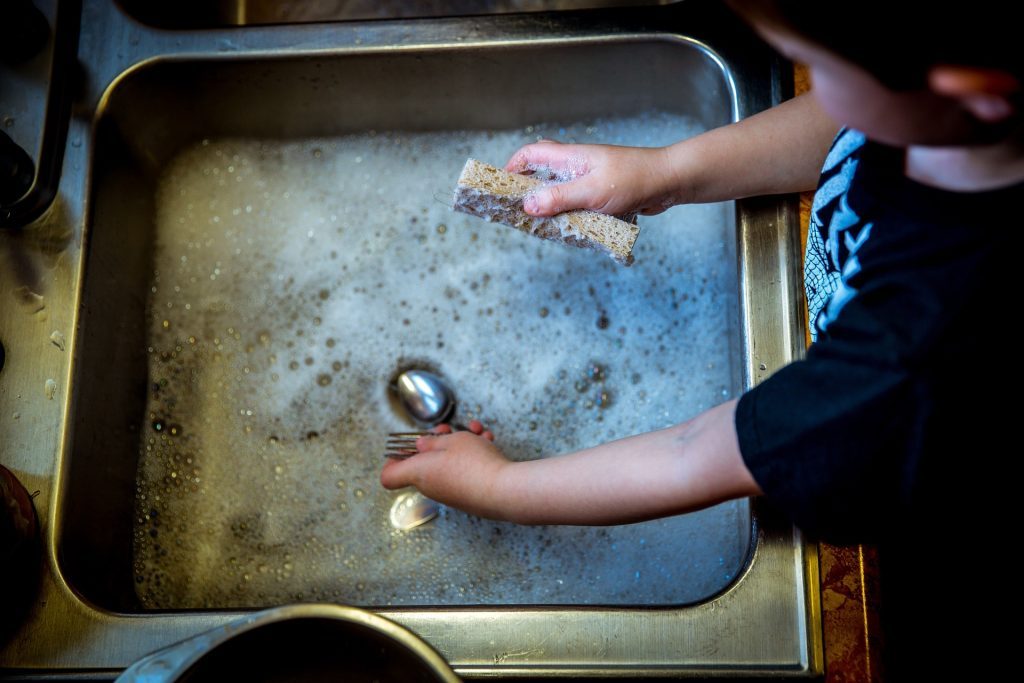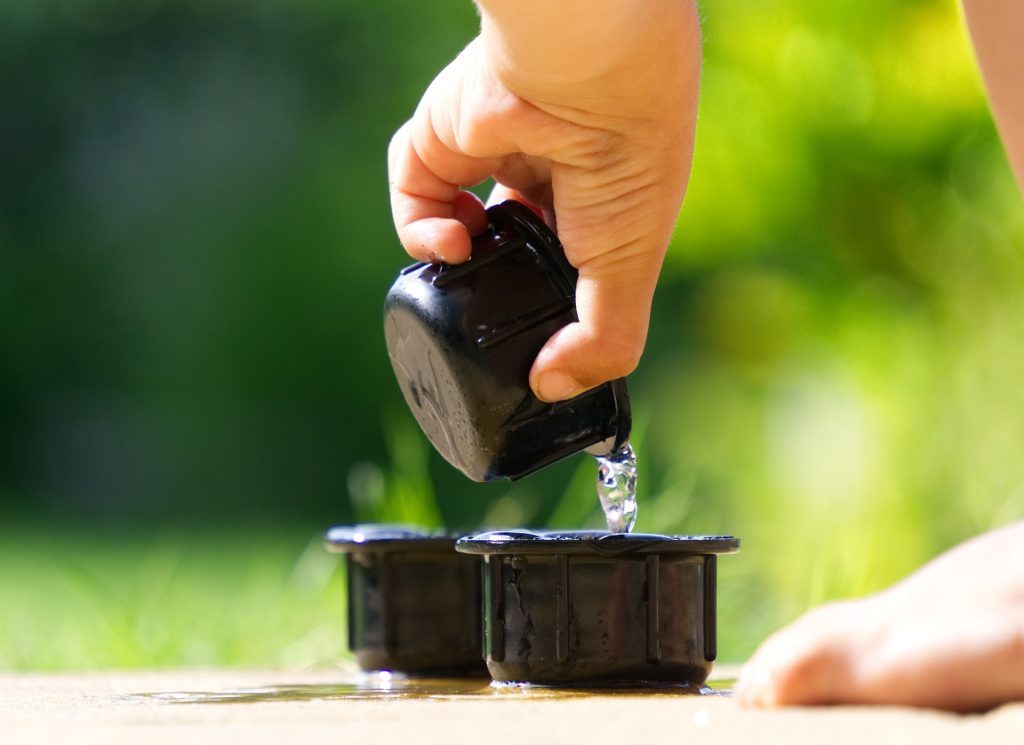
About Scattering Schema
Scattering schema play involves emptying, tipping, spilling, dumping, erasing, crashing, or wiping away objects. Children who repeatedly fill baskets or totes with blocks and dump them out, crash toy cars together with a joyful giggle, take all the dress up clothes off the hooks, and smash down block buildings are probably interested in scattering schema. Such activity allows them to make discoveries about the workings of the physical world, mathematical concepts like quantity, and even how adults react when a child makes a mess.
“‘Objects look different when scattered about or heaped together. But they are of the same quantity even though their appearance changes. The transporting schema leads towards a concept of quantity.”
Tina Bruce, play researcher and theorist
Suggested Loose Parts
Here’s an incomplete list of loose parts that support this play schema:
- Backpacks
- Baskets
- Beads
- Blocks
- Bottle Caps
- Brooms
- Bubbles
- Buckets
- Cardboard Boxes
- Cars And Trucks
- Chalk
- Clothespins
- Corks
- Corn Cobs
- Cotton Balls
- Craft Sticks
- Crayons
- Cushions
- Dirt
- Dish Cloths
- Dishes
- Doll Heads
- Dolls
- Dried Beans
- Dried Orange Slices
- Duplo Blocks
- Egg Cartons
- Erasers
- Fabric Bolts
- Feathers
- Flowers
- Funnels
- Garden Hose
- Gift Cards And Key Cards
- Grass Clippings
- Gumnuts
- Hair Ties
- Hockey Pucks
- Ice
- Keys
- Kitchen Storage Containers
- Lace
- Ladles
- Leaves
- LEGOs
- Light
- Log Slices
- Marbles
- Measuring Cups
- Mesh Poufs
- Milk Crates
- Mud
- Napkin Rings
- Nuts, Bolts, And Washers
- Packing Peanuts
- Paint
- Paint Brushes
- Paper
- Paperclips
- Pebbles
- Pencils
- Pens
- Pie Pans
- Pillowcases
- Pine Cones
- Plastic Animals
- Plastic Food Containers
- Plastic Reusable Ice Cubes
- Poker Chips
- Pompoms
- Pool Noodles
- Pots And Pans
- Purses
- Puzzle Pieces
- Ramps
- Reusable Shopping Bags
- Rice
- Rubber Bands
- Rugs
- Sand
- Scoops
- Seed Pods
- Sewing Bobbins
- Shovels
- Shower Curtain Rings
- Shredded Paper
- Sifters
- Snow
- Sponges
- Spoons
- Spray Bottles
- Sticks
- Suitcases
- Tape Roll Cores
- Thread Spools
- Tires
- Walnuts
- Water
- Wind
- Yarn
Have an idea I should add to the list? Share it in the comments or contact me.
Examples
Some examples of this play schema in action:

Exploring scattering schema play can be messy and may involve activities that are often shut down when they occur in many early learning settings. The adult’s job becomes finding a way to support the activity or provide an acceptable alternative.

On the other hand, you can use an interest in scattering schema to your advantage. Wiping away objects is another way kids explore this schema. That means they may show an interest in helping wash dishes, wipe tables, sweep floors, or vacuum carpets. If they’re interested in these things, let them help.

Water is an unparalleled loose part for supporting scattering schema since so many kids find it fascinating, and it is ideal for spilling, pouring, splashing, dumping, and wiping. The big upside for us adults is that the messes kids make with water tend to be pretty manageable when clean up time arrives.
Contribute content to Playvolution HQ
Brought to you by Explorations Early Learning
Thoughts On This Entry?
I’d love to hear your thoughts on improving this entry and suggestions for additional glossary additions in the comments below. You can also contact me with comments or concerns.
Browse Trainings
Post Author
Jeff Johnson is an early learning trainer, podcaster, and author who founded Explorations Early Learning, Playvolution HQ, and Play Haven.



Leave a Reply